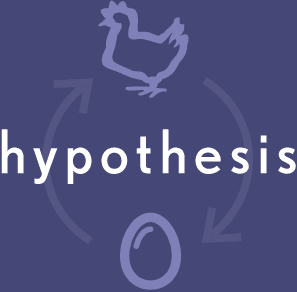Purposes of the hypothesis in quantitative research
- Bringing information together to enable the researcher to make a tentative statement about how the variables in the study may be related
- Stimulating a research endeavor that results in the accumulation of new knowledge
- Providing the investigator with a relational statement
- Providing direction to the research
- Providing a framework for reporting the findings and conclusions of the study

- A hypothesis is a statement or proposition set forth as an explanation for the occurrence of some phenomenon.
- A research hypothesis is such a statement proposed to explain or answer a research question.
- A research hypothesis typically describes an expected difference in variables across groups, a change in variables (through time or otherwise), or an expect of one or more variables on one or more response variables.
- It gives a prediction for the relationship(s) among the variables from the research question.
- Example: The mean high school GPA is higher for students whose parents graduated from college than it is for students whose parents did not graduate from college.
- Research hypotheses can be categorized as directional or non-directional
- A directional hypothesis specifically quantitative the direction of the proposed difference / change / expect.
- Example: Higher doses of a current anti-depressant cause blood pressure to decrease.
- A non-directional hypothesis does not quantify the direction of the proposed difference / change / expect.
- Example: There is a difference in typical participation in college
Why construct a research hypothesis
A research hypothesis gives direction to the research process.
- Provides a testable statement for the researcher
- Provides a framework for explanations and conclusions of the study
- Provides a clear indication of the intention and utility for the audience
Suggestions for deriving hypotheses
- Inductive hypothesis: To formulate a hypothesis as a generalization from apparent observed relationships
- Deductive hypothesis: To deduct a hypothesis as a generalization from existing theories
- Clarity (One relationship at a time)
- An effective research hypothesis makes clear the expected relationships between variables.
- Example: Parental involvement in school is associated with an increase in GPA. (Good)
- Testability
- An effective hypothesis can be tested through observation.
- Often this requires operational definitions of constructs outside the hypothesis itself.
- Example: A daily dose of Ritalin will increase signs of attentive behavior more than a daily placebo. (Good)
- Consistency
- An effective hypothesis represents a consistent extension of current knowledge.
- Example: Male high school students respond poorly to group exercises because they cannot develop empathy. (Not Good)
- Simplicity
- An effective hypothesis is stated as simply as possible.
- State the variables of interest and a proposed relationship.
If multiple relationships are suspected, state multiple hypotheses
Types of hypotheses
- Research Hypothesis
- A hypothesis from observation, the literature, and/or the theory in the study
- A research hypothesis states the relationship one expects to fine as a result of the research
- Null Hypothesis
- A statistical hypothesis is the same as the null hypothesis, because it states that there is no relationship between the variables in the study
- A Null Hypothesis is a hypothesis corresponding to the research hypothesis that proposes no relationship is present.
- Null hypotheses are not reported in research proposals or final conclusions
- Null hypotheses do not represent an expected outcome
- The null hypothesis and research hypothesis are mutually exclusive
- The null hypothesis is never accepted!!!
- Alternative Hypothesis
- This hypothesis explains what the alternative hypothesis is.
- "Children taught by individual instruction will exhibit less mastery of mathematical concepts than those taught by group instruction."
- For the purposes of statistical testing, the research hypothesis is often referred to as the alternative hypothesis, denoted H1 or Ha
- Example: Do males and females participate in academic extracurricular activities at different rates?
- H0: Males and females participate in academic extracurricular activities at the same rate.
- Ha: Males participate in academic extracurricular activities at a lower rate than females.
Testing the hypothesis
Idea: Collect data to determine whether the null hypothesis can be rejected in favor of the research hypothesis.
Reject the null in favor of the alternative only if the observed evidence is suciently strong that the unusual observations cannot be due to chance
- State the expected relationship(s) among variables, the research hypothesis
- State the corresponding null hypothesis
- Select an experiment that will have an expected outcome if the null hypothesis is true
- Collect and analyze data
- If the data are sufficiently unusual according to expectations, reject the null hypothesis in favor of the alternative hypothesis
Quantitative research plan
- Problem
- Hypothesis
- Methodology
- Data collecting
- Data analysis
'Education' 카테고리의 다른 글
| Learning Through Web 2.0 Social Technology (0) | 2012.03.10 |
|---|---|
| 안전분야 최고 강사를 찾아라 (0) | 2011.10.12 |
| The Era of Online Textbook (PDF/EPUB) (0) | 2011.09.22 |
| Defining Mission, Vision, Goal, and Objective of Project (0) | 2011.09.17 |
| Planning the Project (Project Management) (0) | 2011.09.17 |

